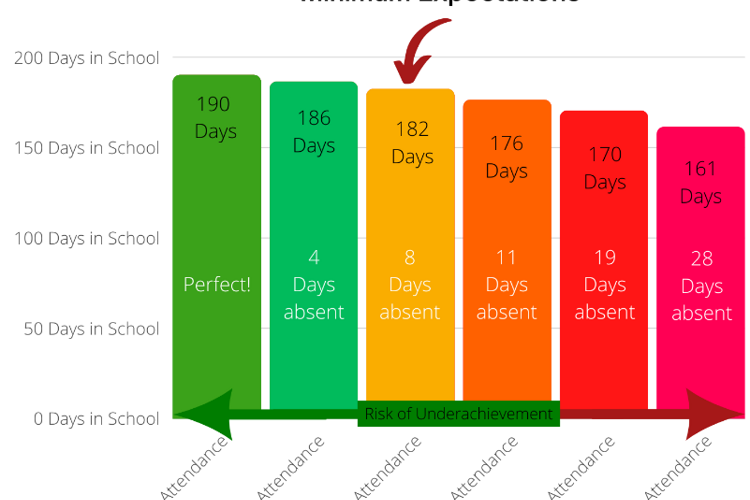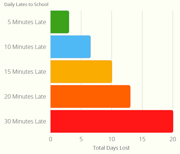- Home
- Information
- Attendance / Absence
Attendance / Absence
Vision
At St George’s School we firmly believe good attendance and arriving on time are crucial factors in a pupils academic success, social and spiritual development and a sense of belonging to our school community. When pupils attend school regularly, they benefit from continuous learning, active participation in class discussions, and the opportunity to build positive relationships with their peers and teachers.
There is a clear link between high attendance and high academic achievement and thus, absence, for any reason, has a negative effect on learning. Attendance is the responsibility of every stakeholder at St George’s School.
Positive and consistent communication between home and school is central to improving and maintaining high levels of attendance.
Expectations
We expect all of our pupils to attend school regularly and on time. We set all pupils a minimum target level of 96%. The school regularly reviews each pupil’s attendance and engages with the Local Authority where attendance falls below 90%. An attendance rate of 90% is equivalent to missing half a day of school per week or one day per fortnight. 6 out of 10 students with an attendance rate of 95% or more gain at least 5 GCSE grades 5-9.
Any absence of a pupil from school or a school activity is detrimental to their education. The diagram below illustrates clearly the impact attendance can have on academic achievement.

| Attendance during one school year | Equal this number of days absent | Which is approximately this many weeks absent | Which means this number of lessons missed |
|---|---|---|---|
| 95% | 8 days | 2 weeks | 50 lessons |
| 90% | 19 days | 4 weeks | 100 lessons |
| 85% | 28 days | 6 weeks | 150 lessons |
| 80% | 38 days | 8 weeks | 200 lessons |
It is our aim that all pupils should have excellent attendance with 100% attendance all of the time, although we understand this is not always possible. Ensuring regular attendance at school is a parent’s legal responsibility, but helping to maintain a regular pattern of attendance is everyone’s responsibility – parents, pupils and all members of school staff.
We are keen to work with parents, pupils and the Local Authority to ensure attendance is as good as it can be to improve the chances of the young people in our care. As a school we have a number of interventions to support pupils who have genuine reasons for missing school. We will always look to help families overcome issues that may be affecting their child’s attendance as sadly pupils who miss school frequently can fall behind with their work and do less well in exams.
Our Senior Attendance Champion is Mrs Welsh.
For more information on attendance, absence and our procedures at St George’s School please read the Absence policy in full, by clicking here.
Pharmacy First
Pharmacy First
When your child is feeling unwell but you can’t get a doctor’s appointment?
NHS England has now enabled Pharmacists to give advice and treat (when appropriate) 7 common health conditions. NHS England » Pharmacy First (use this link for more information)
These conditions are:
- sinusitis
- sore throat
- earache
- infected insect bites
- impetigo
- shingles
- uncomplicated urinary tract infections in women
Most pharmacies in our local area now offer this service but below are a few as guidance:
- Pierremont Pharmacy
73 High Street, Broadstairs, Broadstairs, CT10 1NQ, Kent
- Newington Pharmacy
47 Newington Road, Ramsgate, CT12 6EW, 01843 587353
- Asda Ramsgate Pharmacy
161 High Street Ramsgate CT11 9TT, 01843 838331
- Day Lewis
333 38A St Anthonys Way Margate, Kent, CT9 3RB, 01843 295878
Punctuality
Punctuality
Punctuality is a very important part of time management and self-discipline. It is the responsibility of pupils and parents to ensure they arrive to school on time at 8:30am at both the Primary and Secondary.
If a pupil arrives late to school regularly their learning begins to suffer. It is the responsibility of each pupil to ensure they are in the correct classroom at the right time. The bar chart below illustrates how being late to school every day over a school year soon adds up and this will understandably have a negative impact on learning. At St George’s we believe that arriving to lessons punctually helps create a positive environment for learning and shows that our pupils are ‘Ready to Learn.’

Pupils who arrive after the registers have closed will have to sign in with year support at Secondary or at main reception at Primary depending on time of their arrival and consequences will be set. Parents should inform the school as soon as possible if there are exceptional circumstances that caused their child’s late arrival.
Equally, Secondary pupils are expected to arrive to lessons on time. If pupils are late then an afterschool detention will be set. Where there is a persistent problem with getting to lessons or morning form time punctuality, we will discuss with parents and further consequences will be put in place.
Supporting Your Child's Attendance, plus links
Supporting your child’s attendance
The following advice and support has been collated from Government advice and educational bodies around the support required to improve attendance.
A parent can help support their child attending school by:
- Talking to your child about the importance of attending every class to support their learning.
- Helping your child maintain daily routines; write out a morning and evening routine to follow, including wake up time, leaving the house, completing homework and a bedtime.
- Having a routine for getting up, getting dressed, having breakfast and leaving the house can create a sense of confidence and reduce stress.
- Preparing the night before by checking their timetable, packing bags and laying out clothes.
- Asking about their school day; learn which classes are engaging your child’s interests.
- Discussing ways to increase interest in classes your child does not find engaging.
- Encouraging meaningful after school activities, including sports and clubs.
- Discussing feelings of pressure from other children or feeling alone at school which can lead to skipping or missing school.
- Contacting your child’s Head of Year if they are feeling unsafe.
- Staying on top of your child’s social contacts. Peer pressure can lead to skipping school, while pupils without many friends can feel isolated.
- Scheduling dental and medical appointments outside of the school hours.
- Not letting your child stay home unless truly sick; medical evidence will be requested.
- Communicating with the school - talk to your child’s Year Support or Primary Teacher if you notice sudden changes in behaviour. These could be tied to something going on at school.
Places to seek additional advice and support for your child:
School absences - Kent County Council
Resources - Kent Resilience Hub
Early Help (support for families) - Kent County Council
Parents Mental Health Support | Advice for Your Child | YoungMinds
School Anxiety and Refusal | Parent Guide to Support | YoungMinds
Supporting your child at school | Family Lives
How to Help Your Child Get Motivated in School - Child Mind Institute
School attendance and absence: Overview - GOV.UK (www.gov.uk)
Appointments during the school day
Dental and medical appointments should, wherever possible, be made out of school hours. If your child has an unavoidable appointment, we request that a copy of their appointment letter is sent in advance to our Attendance Office to authorise. When the time arrives for the pupil to leave school, they will be collected and brought to main reception upon your arrival to collect them. Please be aware, that although these may be an authorised medical appointment, if your son or daughter misses a morning or afternoon registration, the appointment will affect your child’s overall attendance percentage.
Holidays during term-time
Holidays during term time
As of 19th August 2024, no holidays can be approved for pupils under any circumstance. Holidays should not be taken in term time and leave of absence will only be granted in exceptional circumstances. A request form should be completed at least 3 weeks before the absence is taken. A copy of the form can be downloaded by clicking here or a hard copy can be obtained from main reception.
Emotional Based School Avoidance (EBSA) – Support for Parents
Emotional Based School Avoidance (EBSA) – Support for Parents
KCC produced resource pack:
Emotionally Based School Avoidance (Resource Pack) (kelsi.org.uk)
Young Minds website:
https://www.youngminds.org.uk/parent/parents-a-z-mental-health-guide/school-anxiety-and-refusal/
Kent Resilience Hub:
Emotional wellbeing advice, guidance and support for highly anxious pupils - Kent Resilience Hub
Webinar:
Downloads
| Page Downloads |
|---|
| 5 Reasons to come to School |



